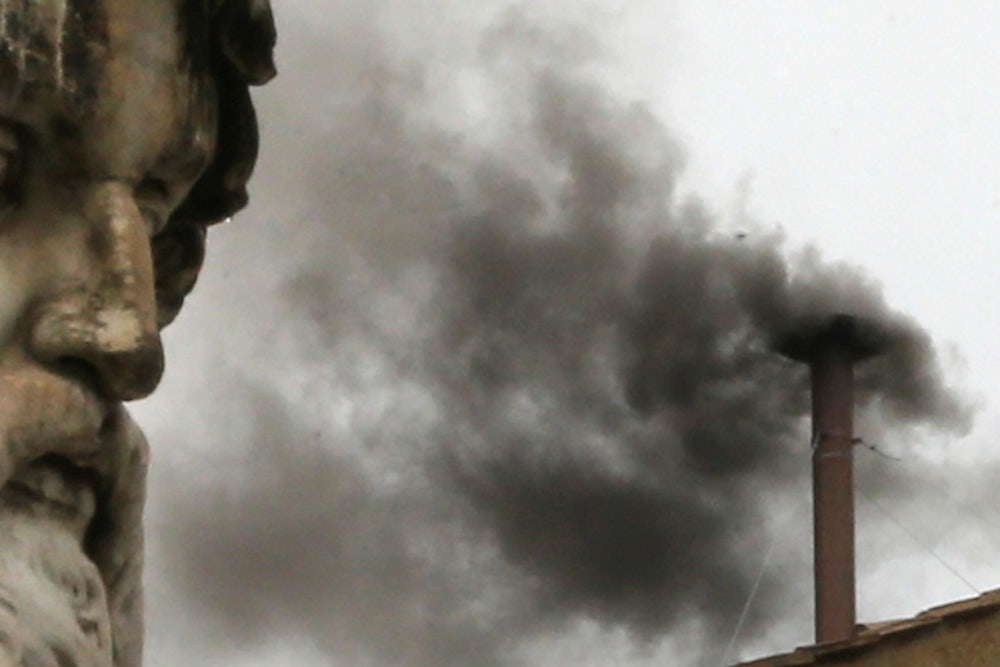It is no surprise to seasoned Vatican watchers that, as of this morning, we have only witnessed black smoke pouring from the chimney atop the Sistine Chapel after three ballots. It was amusing, in its way, to see Chris Cuomo spend several minutes on CNN analyzing whether the smoke was darker this morning than last night. But the real question is: What does the black smoke mean?
Only one papal conclave in the twentieth century reached a decision on the third ballot, the 1939 election of Cardinal Eugenio Pacelli as Pope Pius XII. In 2005, we now know that Cardinal Joseph Ratzinger was very close to the required two-thirds majority after three ballots and, after lunch, he was the nearly unanimous choice of the cardinals on the fourth ballot. But Pacelli and Ratzinger were both the clear and obvious front-runners in those elections, and this year no such obvious front-runner emerged before the cardinals went into—dare we say it—sequestration.
Cardinal Angelo Scola, the archbishop of Milan, is widely considered the front-runner. His theological writings are in line with those of Popes Benedict and John Paul II, and he is also more gregarious than the shy Benedict. The fact that Scola established a dialogue with Islamic leaders while serving as Patriarch of Venice is an obvious strength to his candidacy at a time when churches in Nigeria are being bombed by Islamic extremists. And, of course, the Italians would like to see the papacy back in Italian hands. If there is white smoke this afternoon, it is likely that Scola will be the man coming out on the loggia of St. Peter’s as the new pope.
The danger in being a front-runner, however, is that you are expected to go over the top pretty quickly. If there is no election by the end of today, the cardinals might think Scola cannot secure the necessary votes and start considering other candidates. This occurred in the second conclave of 1978 when Cardinal Giovanni Benelli reportedly came within striking distance of the papacy on the third and fourth ballots, but the opposition intensified and the cardinals began considering the cardinal from Krakow, Poland, Karol Wojtyla, who won election as Pope John Paul II on the eighth ballot.
This year, if Scola can’t win by the close of business today, the cardinals could consider two of the other front-runners, Canada’s Marc Ouellet and Brazil’s Odilo Scherer, either of whom could begin climbing in the balloting this afternoon and go over the top tomorrow. If they stall, the conclave will be wide open and it is anybody’s guess. Also, a coalition to stop Cardinal Scherer, who is widely seen as a pawn of the entrenched Vatican old-guard, could bring those rooting for Scola and those backing Ouellet together behind a third, more acceptable candidate.
This last scenario could produce the first American pope in the person of Boston’s Cardinal Sean O’Malley. O’Malley captured the hearts of the Roman people in the last few weeks: A Capuchin friar who prefers wearing his brown friar’s habit to the scarlet red vestments of a cardinal, O’Malley’s simplicity is accessible and endearing. Known for cleaning house in Boston after the sex abuse scandal erupted there in 2002, and enjoying wide contacts with the Church in Latin America, O’Malley also benefits from the fact that there are three other well-placed Franciscan cardinals in the conclave: the archbishop of Durban, South Africa, the former archbishop of Seville, Spain, and a Brazilian cardinal who worked at the Vatican. If these men started promoting the candidacy of their fellow Franciscan among their compatriots, the O’Malley bandwagon could gain steam quickly as Wojtyla’s candidacy did in 1978. The difference: O’Malley is an American, and some cardinals will hesitate to turn the papacy over to anyone from a country they think controls enough of the world already.
The nightmare for the cardinals is the prospect of an extended deadlock, which would confirm the impression that the Church is in chaos. The pressure within the Sistine Chapel to reach a quick verdict will be acute. But foreseeing a danger and avoiding it are two different things, whether we are talking about Congress and the White House coping with the need to extend the debt ceiling or cardinals electing a new pope. Unlike Congress and the president, however, the cardinals cast their ballots standing in front of Michelangelo’s fearsome Last Judgment, a work of art designed to instill fear in the hearts of the faithful. Looking at that, and pondering the good of the Church, these men who have given their lives to that same Church are unlikely to let this thing spin out of control. Expect white smoke later today or tomorrow.
Michael Sean Winters writes the Distinctly Catholic blog at the National Catholic Reporter. He is a visiting fellow at Catholic University's Institute for Policy Research & Catholic Studies.
